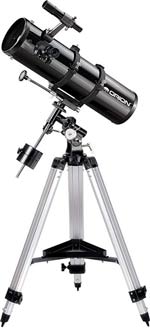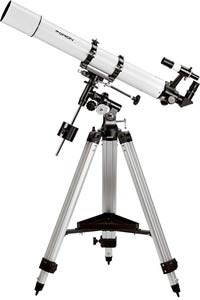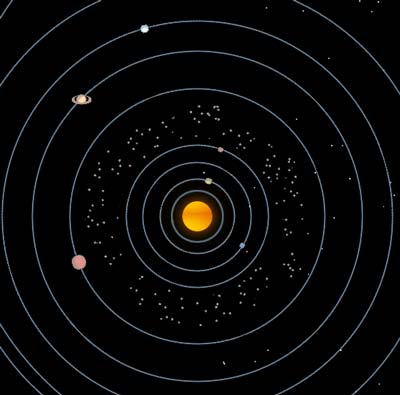Orion Telescope Reviews
Review of Orion Telescopes and Binoculars
by Bill Georgevich, Chief Astronomer
Like a handful of other great companies, Orion Telescopes was founded in a garage. The year was 1975, the year the Homebrew Computer Club had its first meeting in Silicon Valley, and the year an Apollo and Soyuz spacecraft docked in orbit for the first time.
Since then, Orion Telescopes has been a preeminent source of astronomy gear for beginner and amateur astronomers. They achieved this position in the marketplace because of their superb buyer-friendly attitude and a reputation for making high-quality telescopes, binoculars and telescope accessories.
Orion Caters to the First-Time Buyer
Orion Telescopes takes the guess-work out of telescope hunting, making it fairly easy to find the best telescope for your needs and budget.
Like small Mom and Pop shops they assume that there are a lot of first-time buyers—parents who are buying a telescope for their kids or Grandpa getting one for the grandkids. I was introduced to astronomy at age 7 when my Sunday school teacher brought the industry-standard small telescope of the 1950's to my backyard—the 60 mm refracting telescope—a telescope still found in department stortes to this day. But they're really only decent for looking at bright double stars, the moon, and planets. Despite the frustration I had and the early abandonment of that instrument for telescopes that could deliver a brighter, lower power image, I managed to survive my "400 power refractor" and became an astronomer when I grew up anyway.
Orion Telescopes we Recommend
Orion 09007 SpaceProbe 130ST Equatorial Reflector Telescope

- This 5.1 inch aperture reflector telescope gathers an ample amount of light for great views of the planets and Moon, as well as brighter galaxies, nebulas, and star clusters
- Short 24 inch long optical tube design for easy portability and fast f/5 focal ratio for pleasing wide-field performance makes the SpaceProbe 130ST EQ a very versatile telescope the whole family can enjoy
- Sturdy EQ-2 equatorial telescope mount and adjustable tripod allows manual slow-motion tracking of celestial objects as they appear to migrate across the night sky
- Complete assembled telescope weighs just 27 lbs. for convenient transport
- Includes two 1.25 inch Sirius Plossl eyepieces (25mm and 10mm), 6x30 finder scope, 1.25inch rack and pinion focuser, tripod accessory tray, collimation cap, Starry Night astronomy software, and more
Orion 9024 AstroView 90mm Equatorial Refractor Telescope

- A powerful, high-quality refractor telescope at a jaw-dropping low price
- 90mm (3.5") aperture and 910mm focal length for crisp views of deep-sky objects, the Moon, and planets
- Included EQ-2 adjustable tripod and equatorial mount for manual slow-motion celestial tracking
- Includes two Sirius Plossl 1.25" eyepieces (25mm and 10mm), 6x30 finder scope, smooth-adjusting 1.25" rack & pinion focuser, 90-degree mirror diagonal for comfortable nighttime performance, Starry Night astronomy software, and more
- Can also be used for pleasing daytime terrestrial viewing with a correct-image diagonal (correct-image diagonal sold separately)
Orion Takes out the Guess-Work
Orion Telescopes has taken the guess-work out of finding a suitable piece of "telescope furniture" by spending copius amounts of their catalog space discussing different types of telescopes and then as you matriculate though the pages into larger and larger more expensive instruments they rate what you can expect.
This rating tells you 2 important things:
- What an object would look like. They chose the great M13 globular cluster in Hercules to demonstrate brightness and resolving power of various sizes of telescopes. Small refractors and reflectors have a blurry, non-distinct image of the Hercules whereas large refractors and reflectors have a brighter, more clear picture. Having o
- bserved M13 for over 50 years, I can see that those picture approximations accurately portray your observing experience.
- User level. Telescopes are rated beginner, intermediate and advanced. Some of this is obviously marketing poised to get you excited about purchasing the most expensive instrument you can afford. But if you call them, the sales people will be honest with you about how to spend your telescope dollars.
The Orion Generic Brand
The Orion Telescope catalog, in addition to containing the premier brands like Celestron and Meade, also features their own generic house brand of various telescopes and binoculars. The Orion brand of telescope or binocular, like anything generic, is often produced by the same big companies. So like generic drugs, what is the difference?
We have noticed that when it comes to large astronomical binoculars, there is little difference between name brand and generic since the major companies like Celestron and Mead get their binoculars from all the same offshore manufacturers. So in those cases there is very little difference, since Orion will not put its name on a pair of binoculars that yields a truly inferior viewing experience and cause the customer to return the merchandise.
On the other hand, generic telescopes and especially their mounts, motors, and tracking devices can vary in quality since a generic is not built to the same standard of quality. Generic Orion products should be compared carefully to major brands on accuracy of mirror curvature, stability of mounts, and overall fit and finish.
A Summary of the Orion Product Line
by Bill Georgevich, Chief Astronomer
Overall, I would say as a science educator for over 40 years, that a large investment in an instrument of over $3,000 should be looked at in person and "touched" first either in a retail store or most ideally, experienced in the dark with a friend at a star party. Orion attempts to share with you what your observing experience will be at night under actual dark sky conditions, but nothing can rival actually star testing the instrument yourself. Ergonomics is key here and you don't want ot find yourself practicing "Macho Astronomy" because you purchased a telescope unseen out of a catalog.
That said, Orion does provide for a generous 30 day return policy. Just remember that mirrors, lenses, and eyepieces are precision pieces of equipment that can be scratched, dented, or damaged very easily - especially if your fumbling around in the dark.
The other accollade for the Orion company is that they have done a good job providing the novice observer with a healthy combination of direct light viewing experiences in the eyepiece along with the more high tech and fashionable CDD imaging systems that allow you to take quick and easy photographs of celestial objects, guided under high exposure. Orion balances these 2 world quite nicely. They provide large trussed dobonian telescopes that set up quickly for the casual observer, along with clock-driven equatorial mounted instruments that allow time-exposures that can last for hours.
 See an animation of the movement of planets in our solar system.
See an animation of the movement of planets in our solar system. See amazing views from space
See amazing views from space